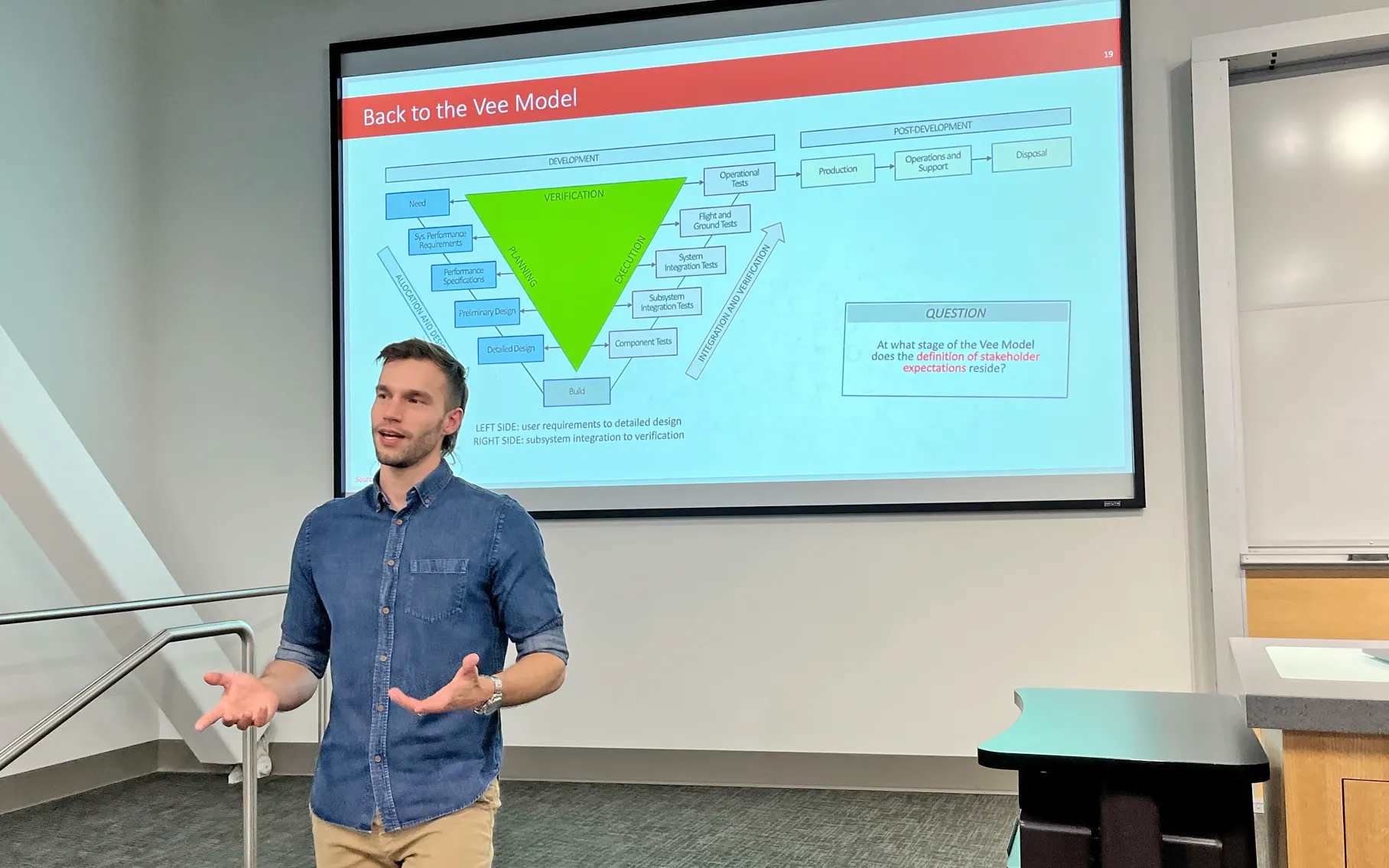Systems Engineering: A Growing Field with Abundant Career Opportunities

Introduction:
In the summer of 2023, the University of Utah's Mechanical Engineering Department launched its highly anticipated Systems Engineering Graduate Certificate online. This ambitious program includes the rollout of a fully online Master of Science in Systems Engineering by the fall of 2024. This development is really exciting for those seeking opportunities to expand their skills and hoping for advancement in their field.
To learn more about this rapidly growing field, we had the chance to ask Systems Engineering professors Dr. Todd Easton and Dr. Pedro Huebner some questions about the program. It was evident how passionate they are about it, their students, and working within this expanding field. They shared insights into the significance of Systems Engineering, the career opportunities it offers, and some of the advantages of pursuing a certificate or degree in this field. Systems engineers play a crucial role in designing, managing, and optimizing complex systems to meet various needs.
What is Systems Engineering?
NASA defines Systems Engineering as “a methodical, multi-disciplinary approach for the design, realization, technical management, operations, and retirement of a system.” Dr. Easton and Dr. Huebner explain that a "system" is any set of parts with sufficiently coherent relationships between them so that, together, they produce the capability required to meet a need. Systems engineers focus on the relationships between these elements to create a cohesive whole that meets specific needs.
“A passenger vehicle is a system. A smartphone is a system. A bridge crossing the Mississippi River is a system. The University of Utah is a great example of a service system, or perhaps an educational system. In our programs, we discuss systems of all kinds!”
IntroducingDr Todd Easton, Dr Pedro Huebner, and Dr Yongzhi Qu
Dr. Todd Easton (he/him) earned his Ph.D. in Industrial and Systems Engineering from the Georgia Institute of Technology. He was a faculty member with tenure in the Industrial and Manufacturing Systems Engineering Department at Kansas State University for 20 years. During that time, Kansas State University awarded him their highest teaching honor, the title of University Distinguished Teaching Scholar. In 2021, he joined the University of Utah as a lecturing faculty with the goals of starting Systems Engineering degrees at the U and dramatically increasing the number of systems engineers in Utah. His research interests are in continuous optimization, combinatorial optimization, analytics, and decision-making. In his limited free time, he enjoys home construction, sports, and a variety of outdoor activities.

Dr. Pedro Huebner giving a lecture
Dr. Pedro Huebner (he/him) joined the U in 2021 to develop Systems Engineering programs and cope with some of the instructional demands associated with the creation and offering of new courses. Prior to that, he worked for three years at the University of Oklahoma in the School of Industrial and Systems Engineering leading a research laboratory in biomedical manufacturing and teaching courses adjacent to Systems Engineering, such as Design of Production and Service Systems and Additive Manufacturing. Pedro also has years of experience in the private sector, including roles in IT consulting, oil/gas business support, and process engineering in the cosmetics manufacturing industry. In his time away from work, Pedro regularly practices swimming with the Queer Utah Aquatic Club, entertains his chiweenie Panqueca, and tinkers with open-source smart home automation systems.
The newest member of the team is Dr. Yongzhi Qu (he/him), earned his Ph.D. in Industrial Engineering and Operation's Research from the University of Illinois, Chicago. He joined the U in July 2023 as a tenure-track assistant professor in Systems Engineering in the Mechanical Engineering department. Prior to that, he worked for four years at the University of Minnesota Duluth in the Mechanical and Industrial Engineering department, where he researched data-driven dynamics and taught courses in manufacturing system integration, Six Sigma quality control, and machine learning. Yongzhi has also worked in the private sector consulting for intelligent asset diagnostics, prognostics, and health management. Currently, at the U, Yongzhi leads a research laboratory of AI-Powered Systems. Yongzhi's goal at the U is to strengthen and assist in the building of a top Systems Engineering program in the US from a modern perspective. Yongzhi enjoys many outdoor activities in his spare time in the Wasatch mountains, including hiking, biking, camping, and skiing.
What is the curriculum within the Systems Engineering program?
According to Dr. Easton and Dr. Huebner, the program is tailored to industries in Utah; including aerospace, defense, healthcare, and manufacturing. Courses cover essential topics like Fundamentals of Systems Engineering, Model-Based Systems Engineering, and Requirements Engineering and Management.
“We assign case studies, discussion sessions, and projects in those areas, while also partnering with local companies that bring 'real world', industry-relevant problems for students to work on.”
The core courses in the program include Fundamentals of Systems Engineering, Systems Engineering and Integration, Model-Based Systems Engineering (MBSE), and Requirements Engineering and Management. Periodically, the program offers relevant electives such as Discrete Event Systems Simulation, Engineering Economic Analysis, Statistical Design of Experiments, Operations Research, Design for Product Safety, Design of Production and Service Systems, and other courses of interest within the University.
How interactive is the Systems Engineering course between students and instructors?
When taking fully online courses, students often want to know how interactive and responsive their instructors will be with them. Dr. Easton and Dr. Huebner have carefully crafted the asynchronous online program to be as immersive as possible, with regular discussions and group projects. The instructors are available to support students during public office hours or during private remote appointments. Each class varies in the level of interaction, but collaboration and networking are deeply embedded into the design of the program.
Who is this Systems Engineering certificate or degree for?
“Our program emphasizes depth as much as it does breadth. Hence, we cover the discipline very holistically, starting from the basics, navigating established book knowledge, international industry standards, and foundational literature that help get everyone on the same page.”
Dr. Easton and Dr. Huebner clarified that the program is suitable for an audience of all backgrounds, from recent graduates
to mid-career professionals seeking to transition into Systems Engineering. The comprehensive curriculum ensures that students with various backgrounds can
succeed in the program, making it an attractive choice for those looking to explore
a new career path. They explained, “Prior Systems Engineering knowledge is not needed
to succeed in the program as we have carefully crafted our courses to include the
necessary materials, tools, and guidance for those coming from more traditional engineering
disciplines.”
“Students at all levels have reported overwhelmingly positive experiences with the program. We often hear that our classes are a “breath of fresh air” that truly complements a more traditional engineering skillset with knowledge from the management sciences that students would not have otherwise.”
On that note, the program is a great first step for those interested in making the
transition into Systems Engineering. “As a matter of fact, many people consider a
small career change and Systems Engineering provides an excellent opportunity for
them to ‘retool’ in a new area. Furthermore, employment with a graduate degree is
frequently more rewarding as one becomes able to identify and remedy issues or problems
more effectively… and confidently!”
Are there internship opportunities available for a Master’s Degree in Systems Engineering?
"Utah has recently enjoyed healthy growth and development of the aerospace and defense industries, boosted by generous strategic funding from federal and state governments."
Experiential learning opportunities in the summer are a common occurrence for Systems
Engineering students. The Professors explained that “Companies contracting with and
operating around the Hill AFB are always hiring systems engineers – emphasis on the
always. As a growing tech and biotech hub, the State has also attracted companies
in IT, energy, healthcare services, biomedical device manufacturing, and automotive,
all of which can leverage the skills of systems engineers, many of which are already
doing it.” The Systems Engineering program, in collaboration with UOnline’s Partnership and Development team, is committed to ensuring student success with external
partners.

Photo by Christina Morillo
What are some of the career opportunities and benefits of the Systems Engineering program?
It's extraordinary how varied Systems Engineer roles are within the job market. Dr. Easton and Dr. Huebner also pointed out that systems engineers often work in product development, testing, and validation, taking on leadership roles due to their ability to bridge various disciplines. With a certificate or degree in Systems Engineering, professionals have an advantage within the job market, leading to salary increases and improved job prospects.
"We also have knowledge of Utah companies offering salary increases to employees carrying a professional certification in Systems Engineering. Our students become more competitive in job interviews and are automatically ahead of the curve when their resumés refer to Systems Engineering training or when they discuss hot topics of the discipline with interviewers."
Systems Engineering Program Highlights
Dr. Easton and Dr. Huebner leave us with two important points:
- “Students can enroll as a 9+1 nondegree-seeking student and take a single course to get started and gauge their interest in the discipline. This makes the application process fairly simple. If they confirm their interest, students can count that course’s credits towards either the certificate or the master’s degree and continue their graduate education at the U."
- "We have also established a close partnership with the Wasatch Chapter of INCOSE, the International Council on Systems Engineering, which hosts events on campus twice a year with the participation of systems engineers from the local workforce. This is always a fantastic opportunity for students to learn, network, and find their next professional challenge.”
In conclusion, Systems Engineering is a diverse field with promising career prospects, and the interview with Dr. Todd Easton and Dr. Pedro Huebner sheds light on its significance within a wide variety of professional settings. Whether you're a recent graduate, a mid-career professional, or someone considering a career change, Systems Engineering could be your next step toward a rewarding and dynamic career.
Click here for more information about University of Utah’s Systems Engineering program.
